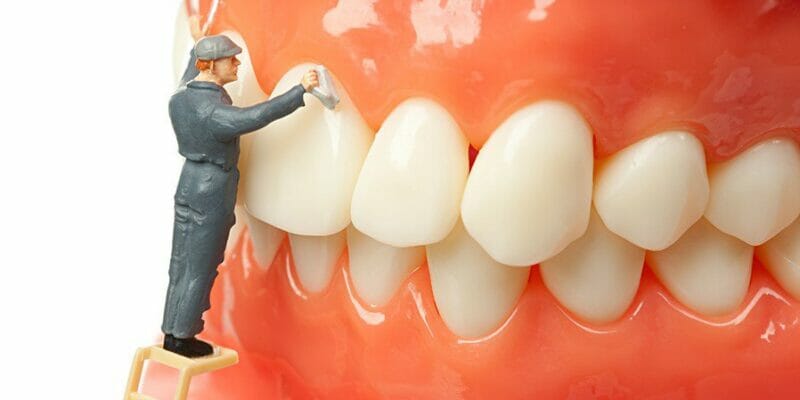
The oral cavity is a party house of microbes! Around 700+ species of microbes including chromogenic, aerobic/anaerobic bacteria’s, viruses and opportunistic fungi thrive in synchrony with all hard and soft dental and paradental structures.
Together they are known to cause a vicious cycle of disorders, which not only cause destruction of dental and paradental structures (gums and periodontium) but also cause systemic diseases with severe effects on all the visceral organs including heart, brain, digestive system and can cause cancer!!!!
If this is the case with natural oral structures, one can imagine the effect of these “local inhabitants” on some “foreign prosthesis”!!!

Dentures/prosthesis are known to have greater colonization of the bacterial phylotypes as compared to the natural structures because of its higher surface roughness and high surface free energy. This is true not only for the plastics/acrylics used in dentures, but also for the most sophisticated titanium and other dental implant material, which are known to show colonization by disease-associated bacteria within 14 days of second-stage surgery.
Thus, whether you are a fresher or a seasoned dentist, you must be well aware that proper cleaning and maintenance of any prosthesis is as important as constructing one. The due care of artificial teeth is obligatory just like natural teeth.
Here’s a quick checklist for our dear patients to keep their “art forms” alive. You may get it printed and give as handouts to your patients or share this article link with them at the final appointment –
Instructions for Removable Dentures
1) Immerse- The artificial acrylic bodies have great chances of getting stained with food stuffs and plaque, and tartar associated problems including halitosis, stomatitis and even candidiasis are increased multifold. Hence, immediately after removing, the denture should first be cleaned with water and then immersed in water with a denture cleaning tablet dissolved. This step helps to remove debris from all around the denture surface even from areas of undercuts and fine fabrication loop holes where the brush cannot reach.

Do’s of the step-
- Use normal temperature water for soaking of the denture
- Use water enough so that the complete denture should get immersed into it.
- Follow the instruction manual for the time and dose of the denture cleaning tablet/solution.
2) Brush- Brushing is an important step even for denture cleaning, just like it is important for our natural teeth. Gentle brushing at least once a day, cleans off plaque from the remaining areas of the denture ,where it is still left behind after immersing.

Do’s of the step-
- Use specialised brushes that are especially designed for cleaning of dentures. If not available in your area, a soft cloth meant only for denture use can also be used.
- Use of non-abrasive pastes for prosthesis is highly recommended as our regular toothpastes have high abrasive index which wears off the acrylic.
- Use gentle strokes; harsh strokes of the brush may leave tiny scratches on the denture, which again act as areas of bacterial build up.
3) Wash- Once the thorough cleaning of the denture is ensured, now is the time for final wash of the denture. The dentures are held under running water to wash all the excess chemicals on the surface and then kept secured.
Practising these basic steps keeps the denture healthy and hygienic to use.
General washing of the dentures after every meal gives the ideal results.
One can also use hand soaps for cleaning dentures, if specialized toothpastes and denture cleansers are not available.
4) Soaking- Once the above-mentioned steps are performed, the dentures are then stored in water; most of the dentures are required to be kept moist for retaining their shape. It is recommended that one can use mild denture soaking solution or even plain water can be used to store the denture overnight. Both should be kept in a clean container or box, meant only for dentures.
5) Oral care after removing denture- Once a person has a prosthesis, he has to understand that its just not the “organs” which have doubled, but also the maintenance of the structures that has also doubled.
After removing the dentures, one has to clean the oral cavity and the associated structures. Use a soft bristled tooth brush for cleaning natural teeth in case of partial dentures and use gauze/ultra-soft bristles to clean soft tissues including tongue, cheeks, palate and floor of the mouth. Remove the denture adhesive if used, from the gums and the alveolus.
Use of mouthwashes is ideal to prevent halitosis and stomatitis associated with prosthesis.
Say No To-

The following must be avoided –
- Harsh/Abrasive cleaning aids– Use of hard bristle tooth brushes, strong cleansers and abrasive toothpastes.
- Hot water– For cleaning of dentures, as well as soaking, one must make sure that the water is not hot, as hot water causes warping of dentures.
- Bleaching toothpastes and chemicals– A strict ‘no’ for the use of bleaching products for cleaning or whitening of the denture and aligners, as they tend to change colour of the prosthesis and also make them weak. Also, metal attachments to the denture tends to corrode due to the reaction with the bleaching agents.
Advertisement:
Instructions for fixed prosthesis and implants-

Every 1 person in 10 people over the age of 40 years, are known to have some kind of fixed prosthesis. Thanks to the development of the newer technologies and the CAD-CAM age that has changed the face of esthetics and smile designing, dentists and patients feels empowered to carve that gorgeous smile using the artificial “pearls.” But the thing to remember is that with great power comes great responsibility and hence maintenance of health and hygiene is of great significance, especially in cases of these “foreign” structures and implants.
Following are few basics to be followed for cleaning of the fixed prosthesis and implants-
Daily toothbrushing-

Brushing of artificial teeth should be done just like that of natural teeth. The tooth brush should be held at an angulation of 45 degrees and modified Bass technique of brushing is recommended. An “electronic tooth brush” is very useful in cases of prosthesis as it has an access to even hard to reach areas and undercuts, and does not create very harsh strokes on the artificial teeth.
Interdental Aids–
Use of interdental aids, including interdental tooth brushes and floss, is highly recommended for use, especially for implant supported teeth and dentures along with the FPD’s, as the natural spillway of teeth along the contact areas is not maintained in artificial teeth. Hence, the tendency for plaque accumulation, leading to gum diseases and peri implantitis, is very high in the cases.
Proportionate interdental brushes are used in back-and-forth motion along the sides of the implant supported tooth and also on the surface under the bridges. The size of the brush is a tricky, as a very small sized brush will not be effective in cleaning and huge heads of interdental brushes will not be comfortable to use.
Flossing is an ideal step that should be performed meticulously as an adjunct to brushing.

Crown and bridge floss- Crowns and bridge floss is specially designed to scrub under and around dental implants. The design includes both, the stiff end and the flexible nylon bristles, which allows entry of the floss conveniently between the implant abutments, plus the high flexibility of the floss allows the thorough entry and cleaning of the gumline as well. It is ideal to use this floss after brushing when toothpaste residues are still inside the mouth, for even distribution of fluoride all over the abutment surfaces.

Water Flosser-Popularly known as an oral irrigator or dental water jet, this device has high efficiency to remove the bacteria in pocket depths that measure up to 6 mm deep. Many dentists prefer water flossers over conventional floss in recent times as conventional flossing is known to shed the bacteria in the surrounding of the implant abutments, which is known to cause peri implantitis.
Pick a right tooth paste– Thanks to the huge marketing era, the market is over loaded with special toothpastes for every disease and every prosthesis. Hence, specialized toothpastes for implants are also available. But in general, for any prosthesis the same rule applies – which is use of non-abrasive/low abrasive toothpastes which can foster the colour and glaze maintenance of the acrylics and the porcelains.
For implants and other fixed prosthesis, fluoride containing toothpastes are advisable as they reduce the secondary infections and bacterial colonization most efficiently.
The Golden Tip-

All said and done, one has to seek professional help and advice from time to time especially when our health and well being is concerned. Regular dental check-ups with a dental professional and professional cleaning, allows your dentist to confirm that your implants and other prosthesis are free of any problems, and to evaluate the overall oral and paraoral health.
Natural or artificial, these precious white and pink pieces lead us to a better living, may it be in terms of physical, mental and social health. Hence, our teeth deserve proper care and maintenance just like any other organ of our body!





















Comments